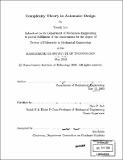| dc.contributor.advisor | Nam P. Suh. | en_US |
| dc.contributor.author | Lee, Tae-Sik, 1974- | en_US |
| dc.contributor.other | Massachusetts Institute of Technology. Dept. of Mechanical Engineering. | en_US |
| dc.date.accessioned | 2006-03-24T16:09:42Z | |
| dc.date.available | 2006-03-24T16:09:42Z | |
| dc.date.copyright | 2003 | en_US |
| dc.date.issued | 2003 | en_US |
| dc.identifier.uri | http://hdl.handle.net/1721.1/29631 | |
| dc.description | Thesis (Ph. D.)--Massachusetts Institute of Technology, Dept. of Mechanical Engineering, 2003. | en_US |
| dc.description | Includes bibliographical references (p. 177-182). | en_US |
| dc.description.abstract | During the last couple of decades, the term complexity has been commonly found in use in many fields of science, sometimes as a measurable quantity with a rigorous but narrow definition and other times as merely an ad hoc label. With an emphasis on pragmatic engineering applications, this thesis investigates the complexity concept defined in axiomatic design theory to avoid vague use of the term 'complexity' in engineering system design, to provide deeper insight into possible causes of complexity, and to develop a systematic approach to complexity reduction. The complexity concept in axiomatic design theory is defined as a measure of uncertainty in achieving a desired set of functional requirements. In this thesis, it is revisited to refine its definition. Four different types of complexity are identified in axiomatic design complexity theory: time-independent real complexity, time-independent imaginary complexity, time-dependent combinatorial complexity and time-dependent periodic complexity. Time-independent real complexity is equivalent to the information content, which is a measure of a probability of achieving functional requirements. Time-independent imaginary complexity is defined as the uncertainty due to ignorance of the interactions between functional requirements and design parameters. Time-dependent complexity consists of combinatorial complexity and periodic complexity, depending on whether the uncertainty increases indefinitely or occasionally stops increasing at certain point and returns to the initial level of uncertainty. In this thesis, existing definitions for each of the types of complexity are further elaborated with a focus on time-dependent complexity. In particular, time-dependent complexity is clearly defined using the concepts of time-varying system ranges and time-dependent sets of functional requirements. | en_US |
| dc.description.abstract | (cont.) Clear definition of the complexity concept that properly addresses the causes of complexity leads to a systematic approach for complexity reduction. As techniques for reducing time-independent complexity are known within and beyond axiomatic design theory, this thesis focuses on dealing with time-dependent complexity. From the definition of time-dependent complexity, combinatorial complexity must be transformed into periodic complexity to prevent the uncertainty from growing unboundedly. Time-dependence of complexity is attributed to two factors. One is a time-varying system range and the other is a time-dependent set of functional requirements. This thesis shows that achieving periodicity in time-varying system ranges and maintaining functional periodicity of time-dependent sets of functional requirements prevent a system from developing time-dependent combinatorial complexity. Following this argument, a re-initialization concept as a means to achieve and maintain periodicity is presented. Three examples are drawn from different fields, tribology, manufacturing system, and the cell biology, to support the periodicity argument and illustrate the re-initialization concept. | en_US |
| dc.description.statementofresponsibility | by Taesik Lee. | en_US |
| dc.format.extent | 182 p. | en_US |
| dc.format.extent | 8552231 bytes | |
| dc.format.extent | 8552039 bytes | |
| dc.format.mimetype | application/pdf | |
| dc.format.mimetype | application/pdf | |
| dc.language.iso | eng | en_US |
| dc.publisher | Massachusetts Institute of Technology | en_US |
| dc.rights | M.I.T. theses are protected by copyright. They may be viewed from this source for any purpose, but reproduction or distribution in any format is prohibited without written permission. See provided URL for inquiries about permission. | en_US |
| dc.rights.uri | http://dspace.mit.edu/handle/1721.1/7582 | |
| dc.subject | Mechanical Engineering. | en_US |
| dc.title | Complexity theory in axiomatic design | en_US |
| dc.type | Thesis | en_US |
| dc.description.degree | Ph.D. | en_US |
| dc.contributor.department | Massachusetts Institute of Technology. Department of Mechanical Engineering | |
| dc.identifier.oclc | 53371538 | en_US |
